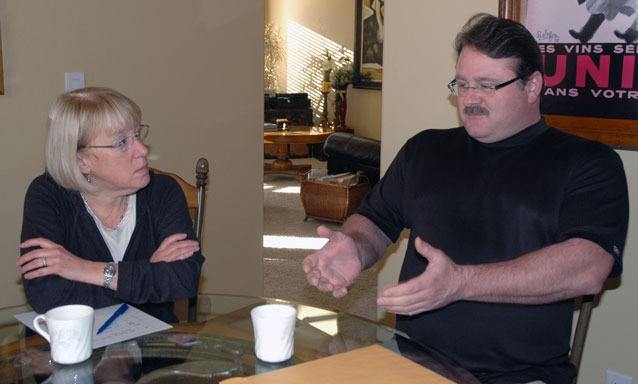MARYSVILLE — Marysville’s Randy Heslop has been unemployed for four months, but he started looking for a new job about a year ago, almost immediately after his former employer, Todd Shipyards in Seattle, was bought out.
“It was a company that had been there a long time, so I thought I was on good, solid ground,” Heslop said. “I’ve lived in this area for 46 years, and what I learned growing up on a farm has guided me through life. I didn’t expect this.”
Even with 20 years of experience in his field at companies including Nintendo and Boeing, he still wasn’t able to find new employment by the time he was finally laid off from his old job.
“I made sure the 30 or so people who were working for me were taken care of because some of them had been there 20-30 years and I felt morally obligated,” Heslop said. “But I never saw any job offers come my way and now I’m faced with hard decisions, like how we’ll make the house payments.”
U.S. Sen. Patty Murray wants unemployed workers like Heslop and Everett’s Deborah Purdom to know that their concerns are her priority, which is why she met with them in Heslop’s house on Wednesday, Jan. 11, after receiving a letter from him.
“Your letter touched me,” said Murray, who’s pledged to extend unemployment benefits through the end of the year, to help support middle-class families like the Heslops. “I’ve heard from a lot of folks whose perspectives are similar to yours, where they never thought of unemployment as something that would happen to them.”
Randy is married to Debbie Buse Heslop — executive director of Washington Home On Your Own, a nonprofit that helps people find housing — and they have three daughters. Purdom is a single mother who worked as a painter, but was forced to quit that job due to the toll it was taking on her health.
“Because I chose to leave, I wasn’t able to get unemployment,” Purdom said. “I had too much money to get food stamps, even though I was pretty poor. I couldn’t afford to feed my kids, and I have no savings to fall back on, so I’m robbing Peter to pay Paul for electricity, gas and the mortgage.”
Murray acknowledged that, if Congress doesn’t act in its upcoming session to maintain emergency unemployment benefits, as many as 13,000 Snohomish County residents could be cut off by July.
Marc Lampson, executive director of the Unemployment Law Project, echoed Murray’s assertion that unemployed people want to find work and invest active effort into their job searches. He added that unemployment benefits are contingent upon such job searches.
“I’d scrub toilets if you said I could get paid for it,” Purdom said.
Randy Heslop spends several hours a day looking for work, only stopping when he’s exhausted his contacts and leads for that day. While he checks with recruiters on a regular basis, he noted that a great deal of job searching has moved online, which limits access to those without Internet connections.
“Plus, I’ve seen how HR operates, and they screen out people whom I would have hired,” Heslop said. “Good people are getting left out.”
Heslop handed a copy of his resume to Murray, who warned that the economic impacts of unemployment on individuals such as Heslop and Purdom create ripple effects that spread throughout their communities.
“This is one of the first issues that’ll be up when the next Congressional session starts,” Murray said. “I’m always looking for more people to write in. Anyone can make charts and graphs, but we need to hear from people about how this is affecting their lives, their livelihoods and their neighborhoods.”



